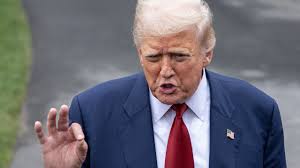



Date Updated: August 6, 2025
In a surprising move, former President Donald Trump has announced he is doubling tariffs on many Indian imports. He made the statement during a live address on his campaign platform. The decision has already shaken markets and raised new concerns about global trade instability.
The decision, which Trump said the hike is a response to “unfair trade practices by India” and India’s refusal to cooperate on bilateral deals.
📢 What the Announcement Means
During the live session, Trump said:
“India has long exploited America’s goodwill. We’re going to fix that. I am officially doubling tariffs on Indian goods, effective immediately.”
He accused India of “unfair subsidies”, “currency manipulation” and preventing American businesses from doing business in India.
This move comes just months after India increased its digital services tax on foreign tech companies—something the Trump camp has criticized heavily.
According to preliminary information released by Trump’s campaign team, the new tariffs will affect several key sectors:
Textiles & Apparel: Now facing up to 50% tariffs
Pharmaceuticals: Targeted with 35% import duties
Steel & Aluminum: Doubled to 60%
Automobile parts and electronics: Tariffs hiked to 45%
Analysts believe this decision could impact over $8 billion worth of trade between the two countries annually.
🇮🇳 India’s Likely Response
Indian officials have not yet made a formal response, but sources inside the Ministry of Commerce suggest a retaliatory tariff package is under review.
Trade experts in Delhi are already urging the Indian government to explore alternate alliances, particularly with the EU and ASEAN nations.
This echoes previous confrontations during Trump’s first term, when India and the U.S. went head-to-head over price controls on medical devices and agricultural subsidies.
This announcement could affect global supply chains.
Many multinational companies—especially in pharma and tech sectors—use India as a manufacturing hub. If trade costs rise, it could force companies to relocate production, which would disrupt delivery timelines and increase costs for consumers globally.
Economists warn that protectionist measures like these can eventually harm both economies.
For a deeper look into how trade wars affect online businesses and digital growth, visit our guide on Brightenx.com.
🗳️ Political Context Behind the Move
With the 2026 U.S. elections approaching, Trump’s campaign has doubled down on its “America First” economic policy, trying to galvanize support among domestic manufacturers and blue-collar workers.
This tariff hike seems to be part of a broader strategy to revive nationalist economic sentiment, especially among Midwest voters hit hard by foreign competition.
Trump also used the moment to criticize the Biden administration’s foreign policy, claiming it “caved to India” on several international agreements.
💬 What Experts Are Saying
Michael Ross, a senior fellow at the International Trade Policy Center, commented:
“This move feels more political than economic. Yes, there are trade issues between the U.S. and India, but doubling tariffs risks triggering a full-blown trade war. That could be disastrous.”
On the other hand, some conservative analysts argue that the step was long overdue, calling India’s trade stance “strategically exploitative.”